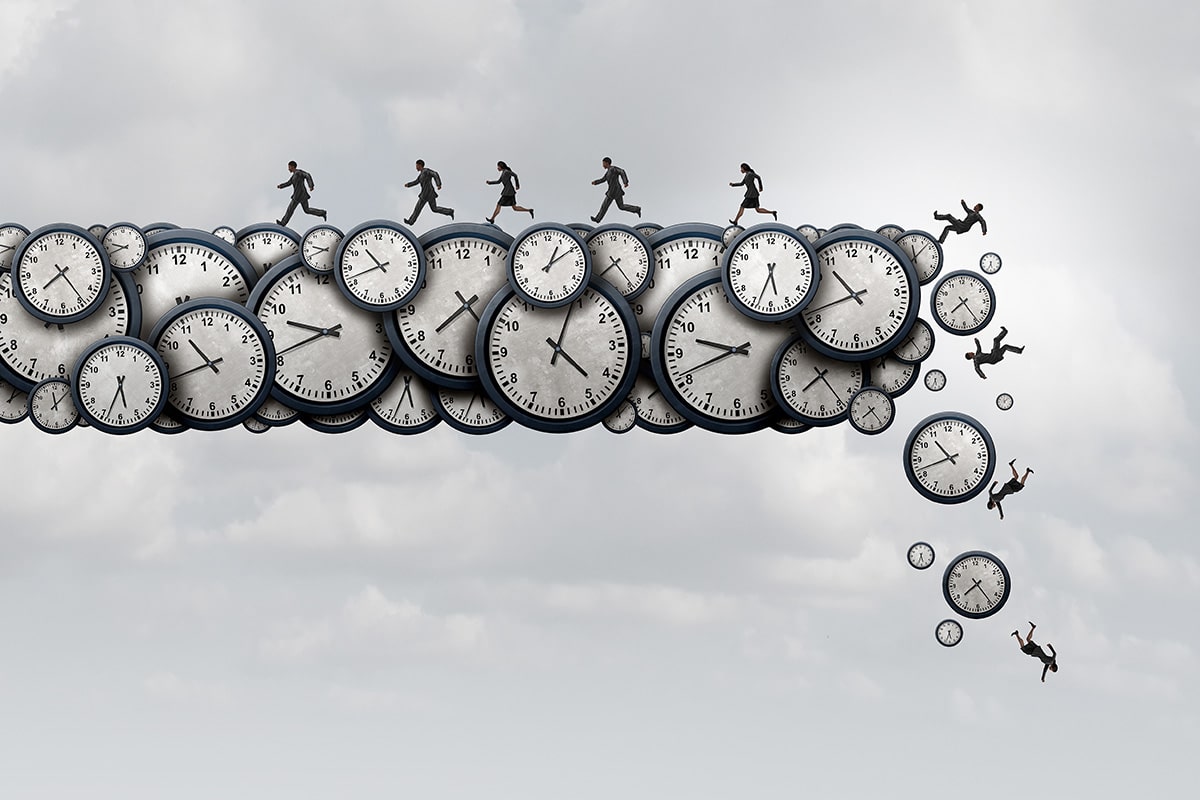In the U.S., working long hours is often associated with success.
This myth is not only proving to be untrue, it’s also creating occupational health risks, including waning physical wellbeing, increased feelings of isolation, mental health challenges, and more. For those who think working long hours leads to a more productive workforce, experts say it’s time to reconsider the effects of overworking. A Stanford University study is one of many that debunk the belief. The research found that productivity per hour declines sharply when people work more than 50 hours a week. After 55 hours, productivity drops so much that putting in any more hours is pointless. And, those who work 70 hours a week only get the same amount of work done as those who put in 55 hours.
There’s a point of diminishing returns in the world of overwork not to mention abundant hazards. In this article, we will explore some of the most common negative outcomes of overworking and why it backfires when it comes to workplace productivity.
1. It’s bad for physical health.
According to research from the World Health Organization (WHO), people working 55 or more hours each week face an estimated 35% higher risk of a stroke and a 17% higher risk of dying from heart disease compared to those who work a more typical 35 to 40 hours per week. The highest health burdens from overwork were noted among men and those who are middle-aged or older. Overwork has been on the rise for years due to phenomena such as the gig economy and telework. With the COVID-19 pandemic thrusting national economies into crisis and reshaping how people work, these trends may accelerate unless businesses start taking corrective actions.
2. Less sleep leads to more mistakes.
As employees work longer hours, the more likely they are to struggle to switch off and relax.
This ultimately leads to sleep deprivation and increased errors. In her paper Sleep: A Business Case for Sleep Time, Dr. Leena Johns explains that “Someone awake for 17 hours straight has the performance ability of a person with a 0.05 percent blood alcohol level—which is legally drunk in many jurisdictions.” Even if employees show up and appear to be busy, they’re bound to make mistakes in their work.
3. Bad habits may result.
When employees are overworked, they are more likely to develop bad habits such as adopting a sedentary lifestyle, snacking on junk food, or turning to alcohol to wind down. They may also have less time with their friends and family, creating feelings of isolation. All of these factors can lead to stress and health problems. For example:
- Overworked employees report more health problems, are less productive, and use more sick days (University College London)
- Stressed-out workers are more likely to develop depression, insomnia, weight gain, and high blood pressure (Mayo Clinic)
- Researchers found that working 61 to 70 hours a week increased the risk of coronary heart disease by 42% and working 71 to 80 hours increased it by 63% (Centers for Disease Control and Prevention)
4. Burnout often ensues.
Giving people too much to do and too little time to do isn’t going to deliver excellent results. In fact, allowing people to be overworked and overwhelmed for extended periods may lead to “presenteeism”. In this situation, employees are present but not productive, which isn’t beneficial to them or the organization.
5. Unhappy team members are more likely to leave.
Employees may not be fully aware of all why they’re feeling unhappy at work, but they are sure to start looking for a new job. Many businesses are currently offering more flexible hours and appealing work cultures to attract new talent, so the chances of losing staff are higher than ever. An ‘overwork culture’ is not only counterproductive, it could also be costly. Turnover is expensive regardless of the type of position an employee holds.
It’s time to shift the focus to employee wellbeing. If employees are overwhelmed, it stands to reason they are more likely to be unhappy and less likely to be efficient. Conversely, contented employees tend to put more effort into their work, which boosts efficiency. To improve productivity, think about what employees need to thrive in the workplace. While that will be unique for every person, the majority of employees want to:
- Feel appreciated and valued
- Understand their role and how it contributes to the business.
- Connect with colleagues
- Have a healthy work-life balance
We’re undergoing a radical transformation in the workplace. The pandemic has forced us to take a long hard look at the modern workplace and at the value of work-life balance, mental health, and flexibility. Taking steps to correct the culture of overwork is the key to making employees happier, healthier, and more productive.
Rather than focusing on the clock, consider how an innovative, adaptable approach to the workday could benefit employees and deliver improved performance. For 25 years, The HR Team has been helping companies develop customized employee engagement strategies. Please reach out to our knowledgeable professionals to find out how we can assist your organization, too.
About The HR Team: Founded in 1996, The HR Team is a Maryland-based human resources outsourcing firm committed to developing strategic, customized solutions that respond to the unique needs and cultures of organizations of all types and sizes. Available as a one-source alternative to an in-house HR department or on an à la carte project basis, the company’s flexible service models address the full spectrum of HR needs that many organizations struggle to address. The HR Team helps clients achieve their highest level of success by providing value-driven human resources services that leave them time to focus on what they do best: directing business growth and profitability. Headquartered in Columbia, Maryland, the firm serves all of Maryland, Washington, DC, and Virginia. To learn more about The HR Team, call 410.381.9700 or visit https://www.thehrteam.com/.







